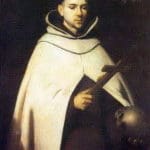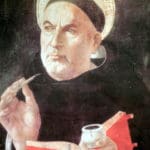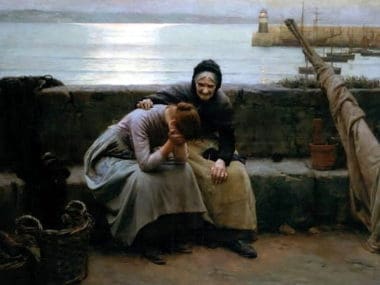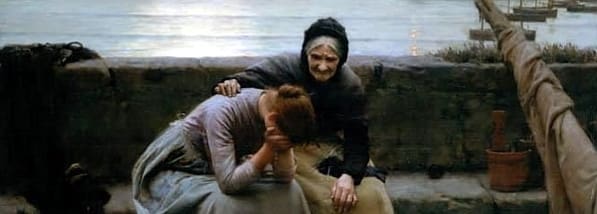Keeping Faith Alive During Life’s Dark Nights (Part II of IV)
Editor’s Note: In Part I, we looked at how faith is a response to revelation, how it penetrates the veil of the ordinary, and how it is essential to our relationship with God. Today, we will examine general patterns of growth which we experience.
Because each soul is unique, the workings of the Holy Spirit are unique in each one of us. However, there are general patterns of growth that we all experience.
From Selfishness to Generosity
Growth is always a move from a self-centered life (selfishness) to an authentically other-centered life (generosity). God inspires us to do the good and to avoid the evil. As we grow in our faith, He leads us to use all of our senses only for that which will bring us into deeper union with Him. At first, we take an active part in this growth. For example, we might choose not to watch movies that could be disruptive to the soul, or we could decide to clear off of the computer anything that has become addictive. We are actively moving toward God.
 Our efforts at purification, however, are not sufficient by themselves. God, in His love, steps in and aids our efforts. Saint Catherine of Siena calls this the “Second Conversion.” St. John of the Cross calls it the Dark Night.
Our efforts at purification, however, are not sufficient by themselves. God, in His love, steps in and aids our efforts. Saint Catherine of Siena calls this the “Second Conversion.” St. John of the Cross calls it the Dark Night.
The Active Dark Night is when we, aided by God’s grace, try to purify ourselves.

The Passive Dark Night is when God steps in and helps us.
St. John of the Cross calls it a Dark Night because we can’t see with our limited human intellect what it is that God is doing, there is a sense of deprivation, and it is always moving us towards inner peace and stillness.
Principles of this Dark Night of Purification
 The Dark Night is meant to be a part of every person’s faith journey. It consists of a prolonged series of profound aridities. In reality, our prayer is not dry; however, it feels dry because the senses, being inferior to the spirit, cannot grasp what the spirit is experiencing, and therefore feel deprived of their former consolation. Since love is in the will and not in the senses, God is leading the soul away from the senses. St. Thomas Aquinas tells us that in the spiritual life there is no standing still. If you are standing still you are necessarily going backwards.
The Dark Night is meant to be a part of every person’s faith journey. It consists of a prolonged series of profound aridities. In reality, our prayer is not dry; however, it feels dry because the senses, being inferior to the spirit, cannot grasp what the spirit is experiencing, and therefore feel deprived of their former consolation. Since love is in the will and not in the senses, God is leading the soul away from the senses. St. Thomas Aquinas tells us that in the spiritual life there is no standing still. If you are standing still you are necessarily going backwards.
Why the Dark Night of the Soul is so Necessary
Humans, by nature, can’t comprehend the grandeur, the spectacular beauty and depth of the relationship with God to which all of us are called. We are short-sighted and tend to become myopic, seeing only immediate goods. We undersell ourselves. We settle for less. We settle for the immediate. Consequently, we must be purified from any spiritual gluttony. This means that we could become in time inordinately attached to sense consolations and forget that consolation is not the end but only the means.
The soul must be cleansed also of spiritual sloth. This refers to a laziness or mediocrity concerning holy things. This is particularly a temptation to those who live and work closest to holy things. With sloth, comes impatience, sluggishness, even disgust for the works of sanctification. The slothful response is “It’s too hard.”
The soul needs to be strengthened in its battle against spiritual pride. During this phase, the person is tempted to pride because of their moderate progress in the spiritual life. This often leads them to critical judgment of others.
Other defects purified through this Dark Night are: curiosity, gossip, jealously, envy, sufficiency: an inappropriate independence, a subtle attitude of “I don’t need others as much as others need others.”
This is an unfailing principle –The bigger the ego, the bigger the Dark Night.
Trials During the Dark Night of the Senses

Some of the trials during the Night of the Senses include the temptation to return to former modes of prayer in search of consolation; the temptation to discouragement can lead some people to simply quit seeking the Lord at all. Often during the Dark Night, one experiences added temptations against patience and against chastity. These temptations are permitted by God to provoke a strong reaction of the corresponding virtues which should strengthen us.
Dark Night of the Spirit and Why it is Necessary
The defects of the proficients in prayer must be purified as well during the Dark Night. Some examples of these defects are involuntary distractions in prayer, and moments of impatience, to name a few. Some people may fall into a “bitter zeal” in which their desire to bring others to God is so strong that they lose the sense of mercy. At this stage, the very depths of the will are purified. Through the Dark Night of the Spirit, the soul learns to want what God wants. This Dark Night offsets an unconscious egoism. It is difficult for us to deal with the blind areas in our life – so God deals with them during this passive purgation.
The Principal Fruit of the Purification
 The Holy Spirit illumines the soul with an infused light. Knowledge of God and knowledge of self lead to the perfection of the virtue of faith. The soul passes from meditation to contemplation. Contemplation is not be confused with visions and ecstasies; it is not extraordinary. Rather, whereas in meditation we learned to know God from afar through the intellect, we now experience Him through love directly, in the privacy of our hearts. We have a “sense of God.” The soul begins to move from the level of sensibility of its exterior life to a greater freedom of spirit. God comes to meet us in these events, circumstances, and relationships that are a daily part of our lives and invites us through them to a greater union with Him. We need to look beyond – or through – the event, circumstance and person to Christ beckoning us to walk through it to the light which envelops Him.
The Holy Spirit illumines the soul with an infused light. Knowledge of God and knowledge of self lead to the perfection of the virtue of faith. The soul passes from meditation to contemplation. Contemplation is not be confused with visions and ecstasies; it is not extraordinary. Rather, whereas in meditation we learned to know God from afar through the intellect, we now experience Him through love directly, in the privacy of our hearts. We have a “sense of God.” The soul begins to move from the level of sensibility of its exterior life to a greater freedom of spirit. God comes to meet us in these events, circumstances, and relationships that are a daily part of our lives and invites us through them to a greater union with Him. We need to look beyond – or through – the event, circumstance and person to Christ beckoning us to walk through it to the light which envelops Him.
Editor’s Note: In Part III, we will examine how to keep faith alive during the dark nights.
Copyright © 2013 | Carmelite Sisters of the Most Sacred Heart of Los Angeles, used with permission.
Art: St. Catherine of Siena, 1746, Giovanni Batista Tiepolo, PD-US; St. John of the Cross, Francisco de Zurbarán, 1656, PD-US; Thomas von Aquin (Thomas Aquinas), Sandro Botticelli, PD-US; Never Morning Wore To Evening But Some Heart Did Break, Walter Langley, 1894, PD; Holy Spirit Detail of Chair of Saint Peter in St. Peter’s Basilica, Sergey Smirnov, own work 03.05.2008, CC-SA; all Wikimedia Commons.




